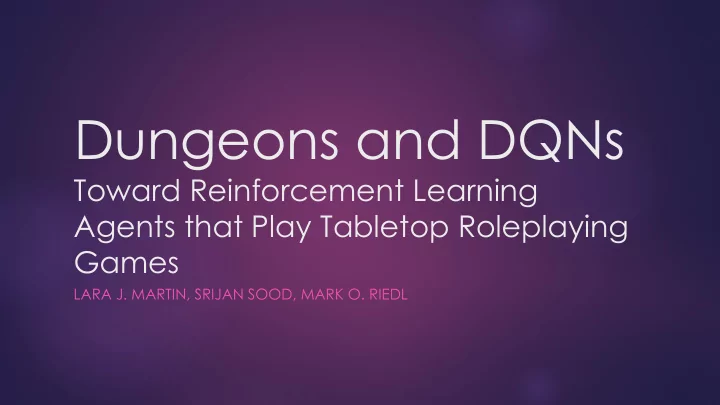

Dungeons and DQNs Toward Reinforcement Learning Agents that Play Tabletop Roleplaying Games LARA J. MARTIN, SRIJAN SOOD, MARK O. RIEDL
2 It’s an exciting time for AI Dungeons & DQNs – Martin, Sood, & Riedl – AAAI Intelligent Narrative Technologies Workshop November 13 & 14, 2018
How do we push the limits of AI? 3 I’m sorry, Dave. I’m afraid I can’t do that. Dungeons & DQNs – Martin, Sood, & Riedl – AAAI Intelligent Narrative Technologies Workshop November 13 & 14, 2018
Games! 4 Chess - 1997 Atari Games - 2015 Go - 2016 Doom - 2016 DOTA 2 - 2018
What about Dungeons & Dragons? 5 Players create characters to play & describe their character’s actions Characters exist in a shared imaginary world Game/Dungeon Master (GM/DM) mediates and sets up scenarios — or campaigns Dungeons & DQNs – Martin, Sood, & Riedl – AAAI Intelligent Narrative Technologies Workshop November 13 & 14, 2018
Why Dungeons and Dragons? 6 Unlimited actions (discourse) Actions can have unexpected consequences and/or DM can get unexpected player actions Actions cannot cleanly map to states (model of the world changes as game progresses) Distributed game world (across players and DM) Players receive intrinsic reward for actions (unclear win condition) Collaborative Dungeons & DQNs – Martin, Sood, & Riedl – AAAI Intelligent Narrative Technologies Workshop November 13 & 14, 2018
Outline 7 TRPGs compared to: Interactive Fiction Experience Management Automated Story Generation Our starting point: Genre Expectation Model + Commonsense Rules Model Deep Q-Learning Dungeons & DQNs – Martin, Sood, & Riedl – AAAI Intelligent Narrative Technologies Workshop November 13 & 14, 2018
TRPGs vs the World 8 Medium Comparison to TRPGs Interactive Fiction (IF) Playing Use puzzles to uncovers pre- • existing story Often simplified grammar • Experience Management Intervenes in storyline to • (Used in Interactive Narrative) keep things “on track” for quality Often fixed set of actions • Automatic Story Generation Generates new story • Uses planners to create • actions for characters for well-defined domains
Outline 9 TRPGs compared to: Interactive Fiction Experience Management Automated Story Generation Our starting point: Genre Expectation Model + Commonsense Rules Model Deep Q-Learning Dungeons & DQNs – Martin, Sood, & Riedl – AAAI Intelligent Narrative Technologies Workshop November 13 & 14, 2018
Assumptions 10 No dice rolling (i.e. no combat, etc.) Agent is always in character GMs aren’t refereeing Dungeons & DQNs – Martin, Sood, & Riedl – AAAI Intelligent Narrative Technologies Workshop November 13 & 14, 2018
The Proposed System (Training) 11 Reward Updated State or <None> Exploit Environment Policy (Rule Engine Event Selection or Update & Current State & State Updater) Explore Updated State Seq2Seq or <None> Distribution of (Genre) Next Events
World Model 12 1. Genre Expectation Model Seq2Seq network generates next event in the story Trained on relevant genre 2. Commonsense Rules Model Things that aren’t mentioned in stories (see: Principle of Minimal Departure) Temporal & physical rules Dungeons & DQNs – Martin, Sood, & Riedl – AAAI Intelligent Narrative Technologies Workshop November 13 & 14, 2018
The Proposed System Pipeline 13 TRPG Agent Event to Natural Agent’s Language Turn Human Selected Player’s Turn Next Event Natural Update Action DQN Language State Selection Event Current to Event State Dungeons & DQNs – Martin, Sood, & Riedl – AAAI Intelligent Narrative Technologies Workshop November 13 & 14, 2018
Back to Games! 14 Atari Games - 2015 Go - 2016 Doom - 2016 DOTA 2 - 2018
Conclusion 15 TRPGs are the next AlphaGo Dungeons & DQNs – Martin, Sood, & Riedl – AAAI Intelligent Narrative Technologies Workshop November 13 & 14, 2018
16 Thank you! LARA MARTIN LJMARTIN@GATECH.EDU Dungeons & DQNs – Martin, Sood, & Riedl – AAAI Intelligent Narrative Technologies Workshop November 13 & 14, 2018
Recommend
More recommend